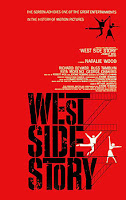Several months ago I went out on a limb and chose the top ten paintings of the last thousand years. Well, inasmuch as the favorite topic at the moment among my friends seems to be movies, I'm going to crawl even further out on the proverbial limb and list the top ten movies of the last thousand years. I know, that sounds like a bit much, but since movies have only been around for a little over a hundred years, it's no great stretch. Speaking as one who has taught both film making and film history, I may not be the greatest expert in the world, but I do have some basis of judgment on the subject. Unfortunately, I am not conversant enough in foreign films to consider them in this list. Likewise, these are not necessarily my favorite movies; and the order of placement in the list may be arguable; but I feel firmly that these ten motion pictures are classics in every sense of the word and should be lodged in the film memory vault of every individual alive.
10. West Side Story--winner of ten Academy Awards; classic Shakespearean plot updated; still as relevant today as in 1961; young people who later became screen legends; the film boasts music and choreography as good as Broadway or Hollywood ever gets.
9. Dr. Strangelove (or How I Learned to Stop Worrying and Love the Bomb)--Dating from 1963, not all the great ones win Academy Awards or strut their stuff in glorious color. Stanley Kubrick's chilling little cold war farce (which he wrote, produced, and directed) just before 2001: A Space Odyssey (tough call between these two) showcases George C. Scott, Keenan Wynn (son of Ed Wynn), and the late, great Peter Sellers in three different leading roles. (I know, that sounds impossible.) James Earl Jones and Slim Pickins also put in appearances. You know a movie has made an impact when it becomes an adjective--strangelovian.
8. Birth of a Nation--Dating from the early silent era (1915), D. W. Griffith taught Hollywood how to make movies. His four-hour epic is loaded with the blatant racism of its time, but the daring scope of its content, and its cinematography rise above that to achievements unknown in its day. Even today it remains a virtual "how to" book on basic film making as well as propaganda. It's American history (albeit from a Southern point of view) as well as film history of the highest caliber (best taken in small doses or with one finger on "fast forward").
7. "Casablanca--Even 1943 "B" movies sometimes achieve greatness. This is a sentimental favorite with probably more unforgettable lines than any movie ever made. Like Strangelove, it demonstrates you can make great movies without great budgets. Bogart and Bergman--film chemistry just doesn't get any better than this.
6. Titanic--Which just goes to show, you can also make great movies in spite of great budgets. Eleven Academy Awards and a zillion dollars in box office loot can't all be wrong. And to give credit where it's due, sharp directing, editing, cutting edge special effects, another Romeo and Juliet plot rip-off, and a great score don't hurt either.
5. The Godfather (Part II)--The Mob never looked so good...or so human. Coppola's dark, mafia masterpieces are not among my favorites but I have to respect his work. Like so many great films, this 1974 sequel, is a blockbuster which could easily have gone terribly wrong, but didn't.
4. Ben-Hur (1959)--The first motion picture to ever win eleven Academy Awards, with two or three of the most memorable sequences ever put on film. Easily the best film of the 1950s, it's a biblical saga with a powerful spiritual message, which yet manages to avoid becoming a Sunday school lesson.
3. Gone With the Wind--What can I say about this 1939 epic that hasn't already been said a hundred times over? It's not a perfect movie. Selznick's pedantic paraphrasing of Margaret Mitchell's dialogue would not give Shakespeare cause for alarm; yet if movies are about greatness--pictures, music, drama, and great stories about great events told with great feeling--then this one holds up quite well now seventy-two years after it was made.
2. Citizen Kane--Considered by many to actually be the "perfect movie," it's amazing how many films on this list were virtual one-man-shows. Maybe a single individual dominating every facet of the work is one of the most important prerequisites for greatness. Whether his name is D.W. Griffith, David Selznick, Orson Welles, Stanley Kubrick, or James Cameron, in so many cases a single artist made the movie great despite sometimes incredible odds. This 1940 masterpiece wrote the sequel to Birth of a Nation insofar as cinematography is concerned.
1. Schindler's List--I'm not ashamed to admit it. Spielberg made me cry.










No comments:
Post a Comment